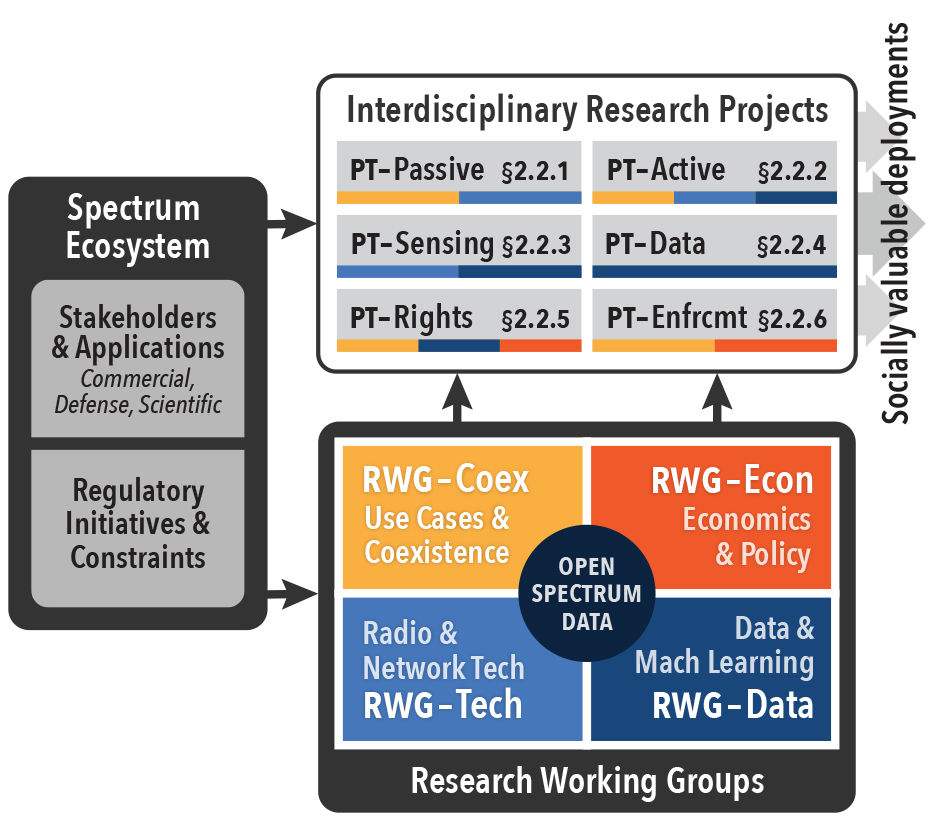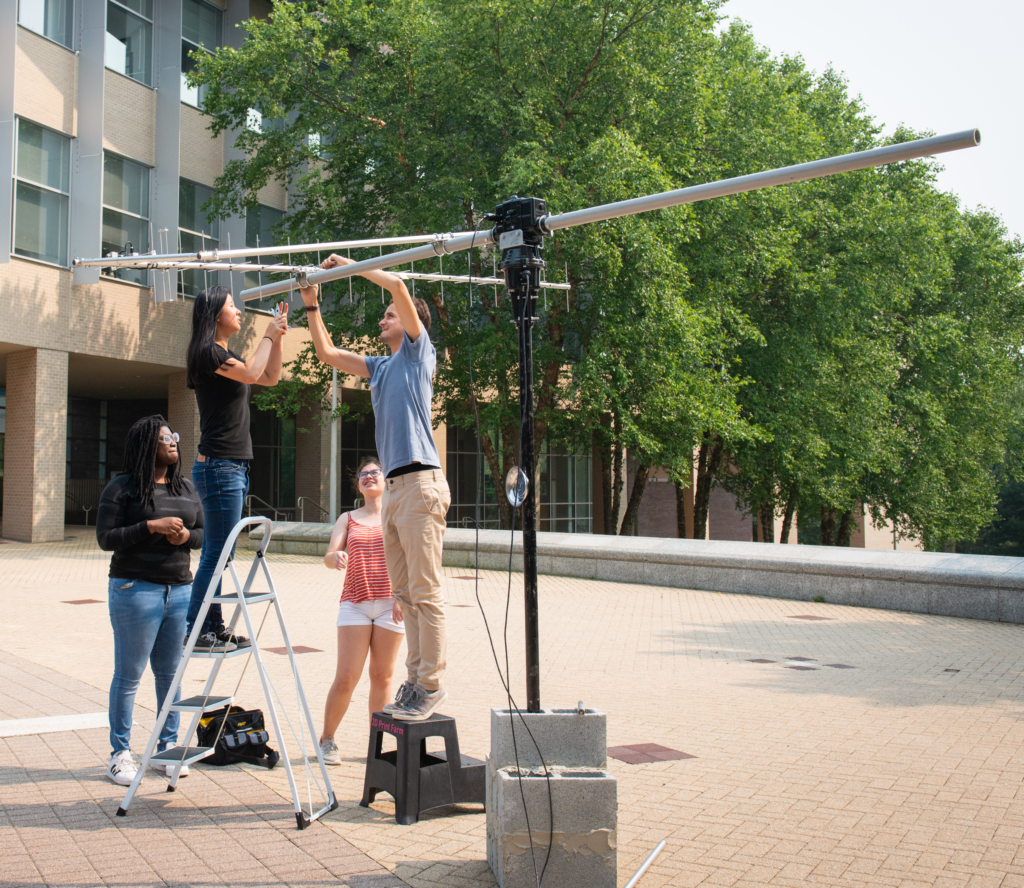Research
The SpectrumX strategic vision and research plan is informed by use-inspired and application-inspired research driven by current and emerging spectrum conflicts. SpectrumX seeks to avoid duplication of research effort, focusing on strategic, integrative flagship projects, and adapting the research agenda to identify and recruit additional expertise, facilities and testbeds. We aim to promote exchange and leverage opportunities.
Key spectrum management and coexistence challenges exist in commercial and public good use cases, separate research and development communities, limited spectrum data, and global competitiveness.

SpectrumX addresses these inherently complex and interdisciplinary challenges through the formation of four Research Working Groups (RWGs): Use Cases & Coexistence, Radio & Network Technologies, Data & Machine Learning, and Economics & Policy. These RWGs are responsible for engaging with stakeholders, tracking the state of the art, identifying key technical challenges and studies, and forming Project Teams (PTs) to define research projects.
SpectrumX will pursue its initial research strategy, described below. The Center enables a convergent research team with deep integration across disciplines designed to solve these complex, vexing research problems.
RWG-Coex: Use Cases and Coexistence
An overarching challenge facing the US spectrum ecosystem is balancing the exploding demand and market sophistication of commercial wireless networks (5G and WiFi, terrestrial and increasingly space-based) with non-market oriented, but essential, uses of the radio spectrum including scientific (environmental remote sensing, radio astronomy); global positioning and defense (radar, communication links, electronic warfare); broadcasting; and others. For example, although the Citizens Broadband Radio Service (CBRS) band (3.55-3.70 GHz) had seen regulatory changes, technology standardization, and initial market traction to enable cellular networks to share spectrum with Navy radars, significant challenges are anticipated in the expansion of this approach to share with other incumbent military systems, e.g., even in the nearby 3.1-3.55 GHz band. Avoiding spectrum conflicts and promoting coexistence between weather forcecasting / Earth remote sensing and cellular or between radio astronomy and satellite megaconstellations appear to be even more daunting, but critical.
The Use Cases and Coexistence RWG, led by Whitney Lohmeyer, collects multi-disciplinary expertise on technical, systems level considerations across use cases. Its key role is to monitor information in Spectrum management, coexistence challenges and major radio events, formulating coexistence models, and engaging with the other RWGs to develop research projects and tasks. This group was essential in prioritizing coexistence challenges to drive SpectrumX’s current research agenda and will require continued growth and diversity as our Center matures.

For more information or to become involved with the Use Cases and Coexistence RWG, please contact Whitney Lohmeyer.
RWG-Econ: Economics and Policy
New applications and evolving technologies for access to spectrum as a common resource give rise to standard economic choices and frictions that are rarely, if ever, considered by scientists and engineers. To further complicate matters, rules and uses both change over time, often dramatically. Spectrum access rights can mitigate frictions and inefficiencies by limiting some activities to protect others. A major theme of SpectrumX is the development of flexible use rights that allow incumbents, including science and the Department of Defense, to optimize trade-offs across spectrum utilization, different technologies, and infrastructure investment.
The Economics and Policy RWG, led by Martin Weiss, collects expertise on spectrum access rights and enforcement, economic analyses, and broader spectrum policy. It complements Use Cases and Coexistence RWG in monitoring information and prioritizing coexistence challenges. Including these perspectives and developing interdisciplinary collaborations is critical, and we welcome interested researchers.
For more information or to become involved with the Economics and Policy RWG, please contact Ilia Murtazashvili.
RWG Data: Data and Machine Learning
Extrapolating from recent trends in coexistence challenges, SpectrumX aims to unify the somewhat fragmented spectrum sensing community by promoting open data sharing platforms for data collection and analytics, leading to our data architecture project. Such platforms will exploit cloud and Machine Learning technologies to support both real-time and long-term characterization of spectrum utilization, propagation, and interference patterns and are likely to become go-to tools for spectrum managers and policy analysts of the future. SpectrumX also aims to dramatically increase sensing capabilities and standardizing data formats, leading to our sensing project.
The Data RWG, led by Anant Sahai, collects expertise on spectrum-related data collection and cloud-based management and analysis, especially using emerging tools from Machine Learning. It supports both the Use Cases and Coexistence and Economics and Policy RWGs to characterize the spectrum environment and evaluate relative performance of spectrum access regimes, and will drive sensing and other radio technology requirements in the Radio and Network Technologies RWG. We encourage experts to join our group and contribute to leading edge research projects related to data and machine learning.
For more information or to become involved with the Data and Machine Learning RWG, please contact Anant Sahai.
RWG-Tech: Radio and Network Technologies
The technologies needed to support the broad range of use cases are often distinct, varying with the operating bands of interest (spanning MHz to THz), differing priorities with regard to performance metrics (bandwidth, power, linearity, sensitivity, and cost), and the time needed for spectrum access. This presents many research opportunities in coexistence with passive and active projects for the creation of new radio devices, components, and network technologies that incorporate interference and coexistence metrics directly into the design.
The Radio and Network Technologies RWG, led by Bobby Weikle, collects component and radio device level expertise in electronic devices, radio circuits and antennas, signal processing algorithms, and network architectures, again from multiple use cases to promote cross-fertilization. RWG-Tech provides inputs to the Use Cases and Coexistence RWG and the Data and Machine Learning RWG on the current state-of-the-art and associated limitations, and from those RWGs obtains requirements for new designs to facilitate spectrum sharing. We welcome interested researchers to join our working group.
For more information or to become involved with the Radio and Network Technologies RWG, please contact Bobby Weikle.
Project Teams (PTs)
Research activities are organized according to the following project teams.
PT-Passive: Coexistence with Passive Sensing
This PT aims to develop approaches that permit coexistence of emerging wireless services and applications with passive scientific receivers at sensitivities that approach fundamental limits. Priorities are managing and mitigating interference to radio-astronomy from mega-constellations and limiting the degradation in atmospheric measurements due to interference from cellular and WiFi.
For more information or to become involved with PT-Passive, please contact Steven Bowers.
PT-Sensing: Spectrum Sensing
PT-Sensing addresses the development of sensors, deployment, and interfaces for spectrum monitoring. The team aims to develop low-cost spectrum sensors, which can be widely deployed, and expand upon the array of currently available sensors with limited, fragmented capabilities. The PT is developing hardware prototypes together with a simple API for interfacing a large number of sensors, along with enhancing sensing capabilities pertaining to mapping, storage, and learning systems.
For more information or to become involved with PT-Sensing, please contact Bert Hochwald.
PT-Data: Open Spectrum Data Analytics
PT-Data aims to support and promote the use of diverse sets of data sources and machine learning for spectrum monitoring and decision making. An objective is the development of spectrum monitoring platforms that serve as open resources for the spectrum-research community, and that supports data collection enabled by PT-Sensing.
For more information or to become involved with PT-Data, please contact Anant Sahai.
PT-Enforcement
This PT views enforcement as securing users and access rights. The project team
promotes coexistence by developing efficient and effective mechanisms to promote and secure spectrum rights. The group approaches this challenge with a combination of machine learning techniques for radio fingerprinting and applying smart contracts and blockchains to automate methods for ex post adjudication.
For more information or to become involved with PT Enforcement, please contact Martin Weiss.